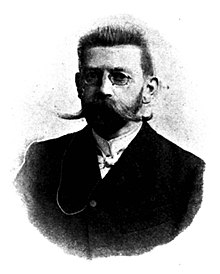
Paul Albert Grawitz (born 1 October 1850 in Zerrin/Sierzno, Kreis Bütow (cf.Bütow/Bytów), Pommern (now Poland) – 27 June 1932 in Greifswald) was a German pathologist. He was an older brother to hematologist Ernst Grawitz (1860-1911), and father-in-law to pathologist Otto Busse (1867-1922).
While he studied medicine at the University of Berlin, he was an assistant to pathologist Rudolf Virchow (1821-1902). After graduation, he continued as an assistant to Virchow until 1886. From 1886 to 1921, he taught as a professor at the University of Greifswald, where he also served as director of the pathological institute.
He is known for his pioneer work with tissue cultures, and his experimentation in the field of bacteriology. "Grawitz' tumour", also known as renal cell carcinoma, is named after him.
Literary works
- Geschichte der Medizinischen Fakultät Greifswald 1806-1906, Greifswald : Verlag von Julius Abel, 1906. - History of the Greifswald medical faculty.
- Die Medizin der Gegenwart in Selbstdarstellungen, 2 vols, 1923
References
- Paul Albert Grawitz @ Who Named It (retrieved September- 2008)
- Mayor, G. (December 1967). "141. Der Wert der angiographischen Untersuchung für die Diagnostik von Nierentumoren". Langenbecks Archiv für Klinische Chirurgie. 319 (1): 830–831. doi:10.1007/bf02659388. ISSN 1435-2443.
See also
- Grawitzsche Geschwulst (Grawitz tumo(u)r, nephrocellular carcinoma), see Renal cell carcinoma
- University of Greifswald
This article about a German scientist is a stub. You can help Misplaced Pages by expanding it. |
This article about a German person in the field of medicine is a stub. You can help Misplaced Pages by expanding it. |
- 1850 births
- 1932 deaths
- People from Bytów
- People from the Province of Pomerania
- German pathologists
- 19th-century German physicians
- 20th-century German physicians
- Humboldt University of Berlin alumni
- Academic staff of the University of Greifswald
- Prussian physicians
- German scientist stubs
- German medical biography stubs